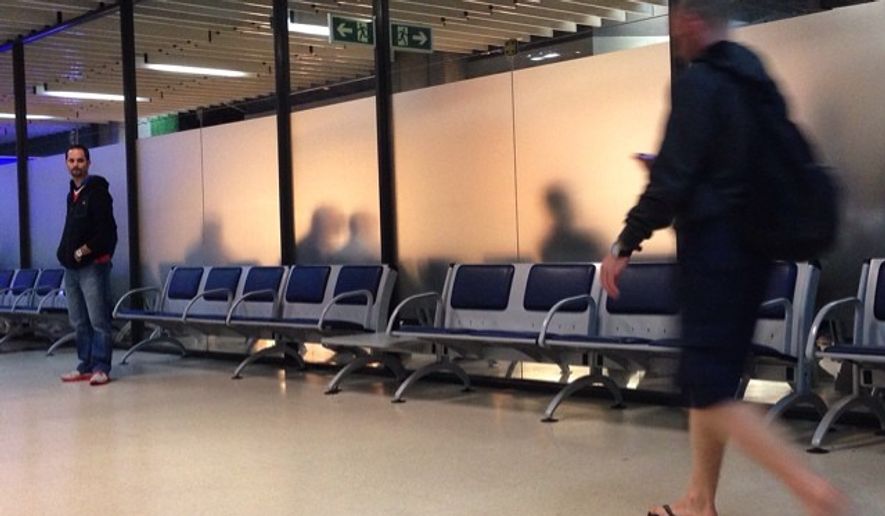A federal judge on Tuesday sentenced the mastermind of a smuggling ring who brought dozens of illegal immigrants from terrorist hot spots into the U.S. to 31 months in prison, rejecting the man’s pleas for leniency and saying he could have ended up getting Americans killed.
Sharafat Ali Khan, while acknowledging his guilt, denied he was the main smuggler, and said he was surprised he’s the only person arrested and prosecuted in the ring, which investigators said helped more than 100 illegal immigrants from Pakistan and Afghanistan sneak into the U.S.
At least one of the men Khan helped had been flagged on the terrorist no-fly list, with family ties to the Taliban, and had been implicated in a plot to conduct an attack in the U.S. or Canada, The Washington Times has learned.
U.S. District Judge Reggie B. Walton didn’t mention that specific incident at Tuesday’s sentencing, but said Khan had played loose with American security by helping sneak people across the U.S.-Mexico border.
“You don’t know whether they’re seeking a better life or whether they’re trying to get in here to engage in terrorism,” the judge said.
“Just because you had good intentions doesn’t mean the people you were helping have good intentions. People could have died, people could have gotten injured, families could have lost loved ones,” Judge Walton scolded Khan.
Judge Walton did show some leniency, cutting what could have been a 37-month sentence down to 31 months. He said that Americans sentenced for the same crime usually would be released into a halfway house for their final six months. Since Khan will be deported and can’t be released to a halfway house, he can skip his final six months, the judge said.
Khan, though, had been asking to be set free immediately, saying he’s already served more than 16 months in custody while awaiting trial and sentencing, and said his mother is ailing and his wife and young child at home in Pakistan need him.
The judge agreed to count the time served against the 31-month sentence, but rejected his demand for immediate release, saying other would-be smugglers need to be taught a lesson.
“If people feel you’re just going to get a slap on the wrist, why not do it?” he said.
Khan pleaded guilty in April to one count of conspiracy to smuggle illegal immigrants for profit, but his sentencing proved to be a complex affair, with the convict insisting he was being unfairly credited with organizing the operation.
He insisted he was just a bit player.
Still, as he appeared Tuesday in an orange prison jumpsuit in federal court in Washington, under guard of U.S. Marshals, he broke down in tears before the judge and insisted he’d learned his lesson.
“I made a mistake. I broke the American law,” he said through an interpreter.
But he also struck a defiant note, wondering why he’s the only person to have been apprehended from what he said was an extensive network involving dozens of people across 10 countries.
“Why was it only me that they brought?” Khan said. “Perhaps my misfortune is that I am a poor Pakistani.”
Federal authorities have identified others involved in the smuggling operation. The Times has withheld names at the request of the government, which says it is still working to snare them.
During earlier proceedings, Khan had portrayed his smuggling as a humanitarian mission, saying he wanted to help poor Middle Easterners find a better life in the U.S.
Prosecutors portrayed him as an unscrupulous, thrice-married, spouse-abusing drug user who risked U.S. national security in order to make quick cash, keeping his customers holed up for months, then forcing them to fend for themselves during the long journey.
Migrants said they paid up to $12,000 to be smuggled from the Middle East through Brazil, then across the Western Hemisphere to try to enter the U.S. They described being kept at one of Khan’s homes in Brasilia for months, then finally sent north — all the while in contact with Khan.
Brazil, and the Sao Paulo airport in particular, are attractive transit points for smugglers because immigration checks are “very lax,” Homeland Security Investigations Special Agent Michael Stempinski testified in court earlier this year.
He said Khan’s network was perhaps the largest operation smuggling people from Pakistan to the U.S., with upwards of 100 people who have been arrested and who have identified Khan as their smuggler during a two-year period from 2014 to 2016.
After his arrest, the number of people sneaking in from Pakistan “decreased significantly,” Mr. Stempinski testified.
• Stephen Dinan can be reached at sdinan@washingtontimes.com.




Please read our comment policy before commenting.